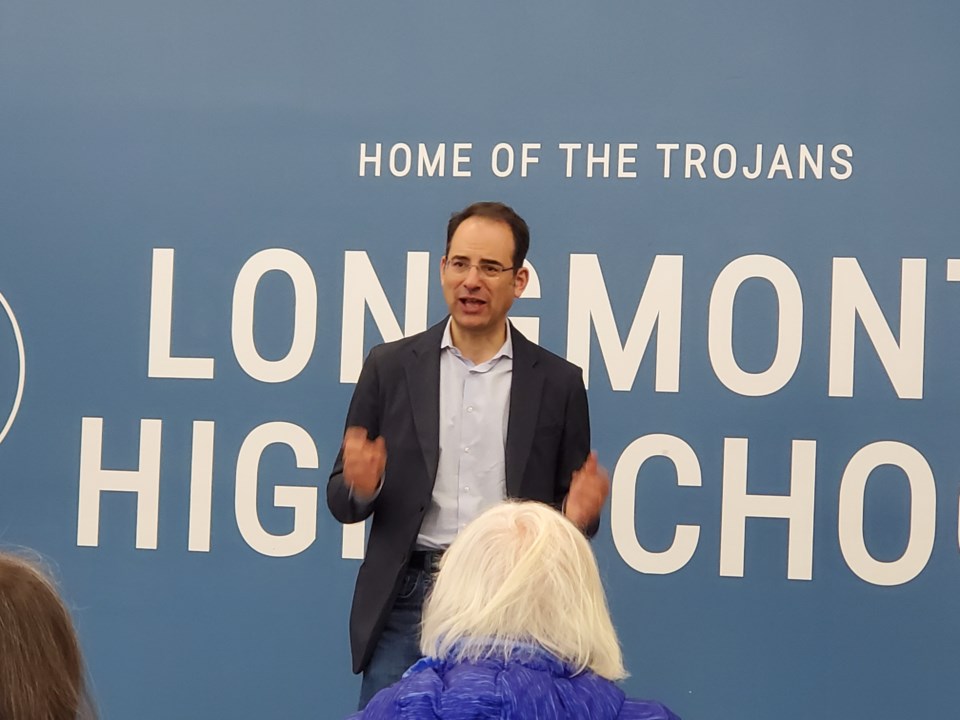A modest but passionate group of residents gathered in Longmont High School's common area Tuesday to participate in the Boulder County listening session with Colorado Attorney General Phil Weiser.
The main topic of discussion was the proposed grocery store merger between Kroger and Albertsons, which has the potential to significantly impact the Colorado market. Kroger operates 148 stores in Colorado under the banners of King Soopers and City Market. Albertson’s operates 105 stores under the banners of Safeway and Albertsons. The merger is estimated to cost $24.6 billion.
Attendees expressed varied reactions to the potential merger with some concerned about its consequences, others simply seeking to understand its implications and a portion adamantly opposed to the idea. Concerns raised during the meeting included potential job losses, increased prices, reduced accessibility and negative effects on those with disabilities.
While the Colorado Attorney General's office continues to gather public input on the proposed merger, it was clear that there was a range of opinions and concerns within the Longmont community. Weiser encouraged residents to engage in the democratic process, attend upcoming meetings and contribute their thoughts and experiences to help inform the state's approach to this complex issue.
"As the People's Lawyer, it's my job to hear from you," Weiser stated. "I am not afraid to take on anybody. I'm suing Google for monopolization. We just successfully sued JUUL for teen vaping."
Weiser explained that under both federal and state law, he has the authority to challenge the merger. If the merger is deemed to substantially lessen competition or tend towards a monopoly, it is considered illegal. Weiser assured attendees that their input would be taken into consideration by the Colorado Department of Law during their evaluation of the merger.
If the merger is challenged, it could go to a court of law to be decided based on the facts and the legal standard. Weiser outlined several possible judicial proceedings, including collaborating with the Federal Trade Commission, suing in federal court or suing in state court. In the end, the decision would be made by a judge, and if the government wins, the merging parties would likely walk away from the merger, Weiser said.
Weiser addressed various concerns raised by the attendees and discussed the importance of analyzing each geographic market individually, such as Longmont and Boulder County, to determine the potential effects of the merger. Over the forty-five-minute session, participants took turns sharing their views on the proposed merger while Weiser gave his feedback and thanks to those who spoke up.
Heather of Frederick shared her concerns about the merger's potential effects on rural communities: "Kroger is all over the country. You go out into rural areas and everything is dollar stores everywhere, and there's hardly any big chains, but it scares the hell out of me. It's like, Okay, well then, there's really nothing except Kroger and dollar stores.”
Weiser responded by highlighting the importance of supply chain resilience and variety. He acknowledged the vulnerability of both rural and urban communities in the face of such mergers.
"This merger could be harmful in different ways in different places," Weiser said. "And that's on us to understand what those harms could be and to stand up for all."
Willow, who has food allergies and a connective tissue disorder, relies on King Soopers for affordable and accessible food options. She fears that the merger could reduce her access to affordable specialty foods and potentially force her to shop at more expensive specialty stores or travel further to find alternatives.
"I worry about this impacting us, and either having a much bigger grocery bill, or me having to strain my body and my health just to be able to have the same access to the things that I need to get by,” Willow stated.
Joseph, a King Soopers employee with 22 years of experience in the grocery business, shared his concerns which included the potential loss of community-centered grocery stores. He stated that he already lives paycheck to paycheck and worries the merger would be financially devastating for his family if he were to lose his job. He was also afraid for his parents, who are aging, and their ability to access affordable prescriptions and groceries.
Weiser expressed his gratitude for the public's involvement and urged attendees to continue sharing their thoughts and concerns. He invited citizens to submit their input online at the Colorado Attorney General's website, where they can find a dedicated page for the grocery merger issue.
“The Albertsons Companies and Kroger are successful when we invest where it matters most — to our associates, customers and communities. Once the merger is closed, we plan to continue important investments to lower prices, enhance the customer expreience and increase associate wages and benefits,” Rodney McMullen, Kroger chairman and CEO, stated in a video message on Kroger’s website.



